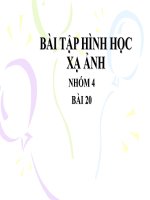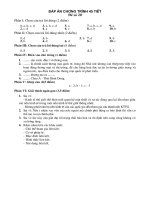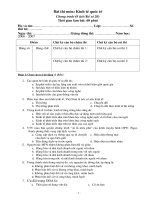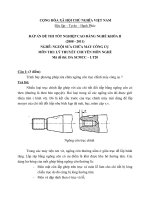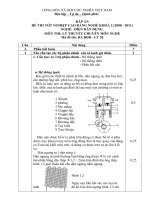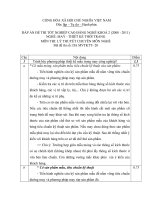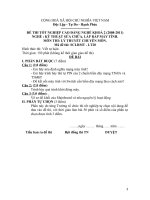PASSAGE 20
Bạn đang xem bản rút gọn của tài liệu. Xem và tải ngay bản đầy đủ của tài liệu tại đây (45.45 KB, 4 trang )
PASSAGE 20
Imaginary friends
By Doris Stokes
We have all heard of children who have imaginary playmates. I get lots of letters from parents about them
and I always say the same thing: don't say there is no one there. What you are putting down to
imagination could be a spirit child.
One dad wrote to me to say he was getting very worried about his child. He told me his son had an
imaginary friend called Robbie, and was forever saying things like, ‘Don't set off yet. Robbie's not in the
car.’
I told him, ‘Your child can actually see that boy, love. Don't say anything. He'll either grow out of it and
go on to more worldly things or he'll develop into a very good medium.’ I was about six or seven when I
first saw the spirit children. I had had rheumatic fever and had to be in a pushchair. I don't know how, but
I knew that other people could not see Christopher and Pansy. I saw them a lot. And you know, I never
could do maths - it was a mystery to me - but Christopher and Pansy helped me pass my exams!
So there's nothing frightening about children having imaginary friends, especially if they've been very
close. I remember one little lad telling his mum, ‘You don't have to come up and turn the light off tonight.
Grandma will do it.’
His mum watched him go upstairs on his own that night and the lights went off! It scares the life out of
some parents. But you just have to accept that his grandma loved him very much. She'd always tucked
him in. It was a routine. Most children are psychic up to the age of 11 or 12. My first psychic experience
happened when I was four. I woke up to a commotion outside in the street.
There was a fire in the house nearby, and all the neighbours were crying. They kept saying, ‘Poor Tom,
what a terrible way to die.’ As I peered from between their legs, I saw they were bringing out a stretcher
with little Tom on it, and Tom was also walking beside it. I told my dad I'd seen Tom and he said, ‘If you
did, love, then you did.’ You see, I'd seen Tom's spirit walking beside him.
My mum warned me that I'd end up in a mental hospital. I did. Nearly 40 years later I was a nurse in one!
Question 1. What does Doris say about imaginary playmates?
A. They are commonplace
B. They are definitely imaginary
C. They write letters
D. There is no such thing
Question 2. The underlined phrase “set off” in the second paragraph probably means __________.
A. come home
B. begin the journey
C. set something aside
D. talk about somebody
Question 3. What is her advice to the father who wrote her a letter?
A. tell your son Robbie doesn’t exist
B. your son is a good story teller
C. It could be a stage he is going through
D. Make a special place for Robbie
Question 4. What was special about the author’s contact with Pansy and Christopher?
A. She only met them a few time
B. She had been ill
C. They ran and played together
D. They helped her with her school work
Question 5. What did the mother think when the light went out?
A. This is scary
B. Grandmother always does it
C. He is being naughty
D. There is nothing to worried about
Question 6. What does Doris claim about the psychic powers of children?
Page 1
A. Children over 12 are not psychic
B. Children tend to lose their powers after 12
C. Children are only psychic until 12
D. A few children are psychic at some point
Question 7. What happened after the fire?
A. Doris knew Tom wasn’t dead.
B. She knew she had seen the fire before in a dream.
C. Her father had seen Tom’s spirit too.
D. Her father said he believed what she told him.
Question 8. According to the passage, Doris’ mother _________.
A. became psychic herself
B. thought Doris was going mad
C. thought Doris was psychic
D. knew Doris was going to become a doctor
ĐÁP ÁN
1-A
2-B
3-C
6-D
7-D
8-B
4-D
5-A
LỜI GIẢI CHI TIẾT
Question 1:
Doris nói gì về những người bạn tưởng tượng?
A. Chúng là phổ biến
B. Chúng chắc chắn là tưởng tượng
C. Họ viết thư
D. Khơng có điều đó
=> Dẫn chứng: I get lots of letters from parents about them and I always say the same thing: don't say
there is no one there. What you are putting down to imagination could be a spirit child.
Dịch; Tôi nhận được rất nhiều thư từ cha mẹ về họ và tơi ln nói điều tương tự: đừng nói rằng khơng có
ai ở đó. Những gì bạn đang đặt xuống trí tưởng tượng có thể là một đứa trẻ nhìn thấy được tinh thần.
Question 2:
Cụm từ được gạch chân “set off” trong đoạn văn thứ hai có nghĩa là __________.
A. về nhà
B. bắt đầu cuộc hành trình
C. đặt một cái gì đó sang một bên
D. nói về ai đó
=> set off on a journey: bắt đầu một cuộc hành trình
Question 3:
Lời khun của cơ ấy cho người cha đã viết cho cơ ấy một lá thư là gì?
A. nói với con trai của bạn Robbie khơng tồn tại
B. con trai của bạn là một người kể chuyện hay
C. Đó có thể là một giai đoạn mà con ơng ấy đang trải qua
D. Tạo một vị trí đặc biệt cho Robbie
Dẫn chứng: I told him, ‘Your child can actually see that boy, love. Don't say anything. He'll either grow
out of it and go on to more worldly things or he'll develop into a very good medium.
Page 2
Dịch: Tơi nói với anh ta, “Con của bạn thực sự có thể nhìn thấy cậu bé đó, tình u ạ”. Đừng nói gì cả.
Cậu bé hoặc là sẽ phát triển ra khỏi điều đó và tiếp tục với những thứ trần tục hơn hoặc là sẽ phát triển
thành một nhà ngoại cảm tốt.
Question 4:
Điều gì đặc biệt về mối liên hệ của tác giả với Pansy và Christopher?
A. Cô ấy chỉ gặp họ một vài lần
B. Cô ấy bị ốm
C. Họ chạy và chơi cùng nhau
D. Họ đã giúp cô ấy làm việc ở trường
Dẫn chứng: I don't know how, but I knew that other people could not see Christopher and Pansy. I saw
them a lot. And you know, I never could do maths - it was a mystery to me - but Christopher and Pansy
helped me pass my exams!
Dịch: Tôi không biết làm thế nào, nhưng tôi biết rằng những người khác không thể thấy Christopher và
Pansy. Tôi đã nhìn thấy họ rất nhiều. Và bạn biết đấy, tơi khơng bao giờ có thể làm tốn - đó là một bí ẩn
đối với tơi - nhưng Christopher và Pansy đã giúp tôi vượt qua kỳ thi!
Question 5:
Các bà mẹ đã nghĩ gì khi đèn tắt?
A. Điều này thật đáng sợ.
B. Bà ln làm điều đó
C. Con họ đang nghịch ngợm.
D. Khơng có gì phải lo lắng cả
=> Dẫn chứng: His mum watched him go upstairs on his own that night and the lights went off! It scares
the life out of some parents.
Dịch: Mẹ anh ta nhìn anh đi lên lầu vào tối hơm đó và thấy đèn tắt. Với cha mẹ thì đó là một cuộc sống
đáng sợ.
Question 6:
Doris tuyên bố gì về năng lực ngoại cảm của trẻ em?
A. Trẻ em trên 12 tuổi không phải là nhà ngoại cảm
B. Trẻ có xu hướng mất năng lực sau 12
C. Trẻ em chỉ là nhà ngoại cảm cho đến khi 12 tuổi
D. Một số trẻ em bị tâm lý tại một số điểm
Dẫn chứng: Most children are psychic up to the age of 11 or 12. My first psychic experience happened
when I was four.
Dịch: Hầu hết trẻ em đều là nhà ngoại cảm ở độ tuổi 11 hoặc 12. Trải nghiệm ngoại cảm đầu tiên của tôi
xảy ra khi tơi lên bốn.
Question 7:
Điều gì đã xảy ra sau vụ cháy?
A. Doris biết Tom đã chết.
B. Cơ biết mình đã nhìn thấy ngọn lửa trước đây trong một giấc mơ.
C. Cha cô cũng đã thấy tinh thần Tom.
Page 3
D. Cha cơ nói rằng ơng tin những gì cơ nói với ơng.
Dẫn chứng: I told my dad I'd seen Tom and he said, ‘If you did, love, then you did.’ You see, I'd seen
Tom's spirit walking beside him.
Dịch: Tôi đã nói với bố tơi rằng tơi đã nhìn thấy Tom và ơng ấy nói, "Nếu con đã muốn, thì con yêu, con
hãy làm.” Bạn thấy đấy, tôi đã thấy tinh thần của Tom đi bên cạnh ông ấy.
Question 8:
Theo đoạn văn, mẹ Doris _____
A. trở thành nhà ngoại cảm
B. nghĩ Doris sắp phát điên
C. nghĩ Doris là nhà ngoại cảm
D. biết Doris sẽ trở thành bác sĩ
Dẫn chứng: My mum warned me that I'd end up in a mental hospital.
Dich : Mẹ tôi đã cảnh báo tôi rằng tôi phải vào bệnh viện tâm thần.
Page 4
